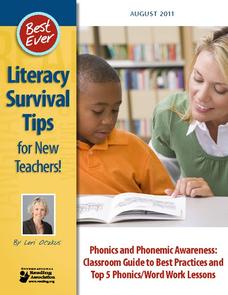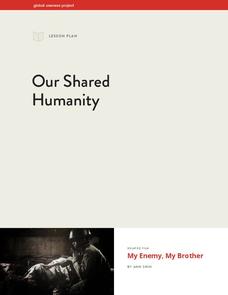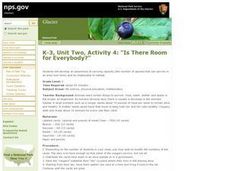Curated OER
Animal Adaptations
Students expand their knowledge of animal features and behaviors that can help or hinder their survival in a particular habitat. They participate in classroom discussions and visit a website to research animals
Curated OER
Naturally Disastrous!
Students explore, research and examine the causes of natural disasters and how to survive them. They research on the internet world climate, recent disasters, how they happen, what to do if one occurs and what preventive measures to take...
Curated OER
From Foraging to Farming
Sixth graders understand the basic needs of humans. In this basic needs activity, 6th graders participate in an activity to search for their basic needs. Students recognize the problems when their is scarcity of a necessity to their...
Curated OER
Sizing Up the Supersize Croc
Students examine and compare traits of humans and crocodiles. For this crocodile lesson students use a ratio to estimate the height of a person and compare that to a crocodile.
Curated OER
The Gulf of Maine
Students examine the effect of limiting factors, especially when it comes to human beings. They examine data from the Gulf of Maine area.
Curated OER
Trails of Understanding: The Earliest Immigrants
Students research Native American tribes. In this human migration lesson, students determine how tribes lived and established cultures. Students create PowerPoint presentations that feature their findings.
National Wildlife Federation
What's Your Habitat?
How are third graders like rabbits? They both live in habitats and require food, water, and shelter to survive! An educational science instructional activity encourages your learners to think about their own habitats and survival needs,...
Advocates for Human Rights
Refugees and Asylum Seekers
To gain a deeper understanding of the plight of refugees and asylum seekers, class members read stories written from the point of view of an emigrant, map the individual's journey, and note the human rights affected by each stage of the...
Rainforest Alliance
Protecting the Critical Habitat of the Manatee and Loggerhead Turtle
Explore ocean habitats with a lesson that showcases the home of manatees and loggerhead turtles in Belize. Here, pupils compare and contrast the homes of ocean animals to those of humans, listen to an original short story about the...
American Psychological Association
Using Psychological Perspectives to Answer Questions on Behavior
Perspective is everything when it comes to assessing human behavior. Class members examine a series of statements and identify the perspective represented by each to demonstrate their understanding of different psychological perspectives.
Baylor College
Needs of Living Things: Post-Assessment
Assess your class's knowledge of the needs of living things with the final instructional activity in a series. Given a large piece of paper and coloring utensils, young scientists draw a picture of themselves and a plant or animal of...
Curated OER
Education: Passing Enough Knowledge to Survive to the Next Generation
Students compare and contrast the knowledge requirements for human and animal children. They identify the consequences of an animal if it is unprepared for the given environment. They discover the importance of education as well.
Curated OER
Wilderness Survival: A Field Practicum
High schoolers are provided with hands-on-field testing of authentic applications from principles pertaining to: Psychology A. Develop a positive, can-do attitude with a high degree of self-reliance that is transferable to human...
Curated OER
Wilderness Survival: A Field Practicum
Students use hands-on field-testing of authentic application from principles pertaining to: Psychology- A. Develop a positive, can-do attitude with a high degree of self-reliance that is transferable to human interactions outside of the...
Curated OER
Human Population's Response to Re-emerging and Emerging Infectious Diseases
Students examine the human population response to microbial diseases. In this disease lesson students observe population trends, write about a scientist and evaluate and defend current treatments for infectious diseases.
Curated OER
Post-Nuclear War Survival
Students use critical thinking and discussion to solve a problempresented in a hypothetical dilemma.
International Reading Association
Literacy Survival Tips for New Teachers!
Whether new to teaching or a seasoned pro, this 12-page phonics and phonemic awareness guide is a must for your curriculum library. Everything from a summary of research on the topic to exercises and activities is included.
Global Oneness Project
Our Shared Humanity
Ann Shin's award-winning documentary, My Enemy, My Brother introduces viewers to Zahed Haftlang and Najah Aboud, two child soldiers on opposite sides during the Iran-Iraq war. After viewing the film, class members are asked to reflect on...
Curated OER
I Will Survive!
Fifth graders explain specialized structure and variation. They describe how some characteristics could give a species a survival advantage in a particular environment. They see how specialized structures and variations help species...
Curated OER
Is There Room for Everybody?
Third graders examine the capacity of animals able to live in one habitat. In this habitat instructional activity, 3rd graders play a game that shows the food chain and the interactions between animals in an area. Students discover that...
Baylor College
We Need Water
There's nothing quite like a glass of ice-cold, freshly squeezed lemonade. Lesson seven of this series explains how the water humans need to survive can come in many forms. Teach your class about how much water humans require every day...
Curated OER
Saving Sturgeon
Marine biology apprentices interpret data of sturgeon interaction with gill nets. They use the data to calculate the percentage of fish entangled in each twine size to discover if there is any correlation. This is a valuable exercise in...
Michigan State University
Bug Lyphe!
Introduce ecology classes to biodiversity and interdependence in ecosystems with a PowerPoint presentation. Then, they get up-close and personal with the invertebrate world by collecting insects, classifying them, and graphing their...
Curated OER
We've Come a Long Way, Baby!
Pupils study technology and the different reproductive technologies available today. In this human reproductive technology lesson students describe how engineers create technologies to improve the health of mothers and babies.
Other popular searches
- Human Survival Needs
- Human Survival Inquiry
- Human Survival Food
- Human Survival Inqiry
- Human Survival in Wilderness
- Rules of Human Survival

























